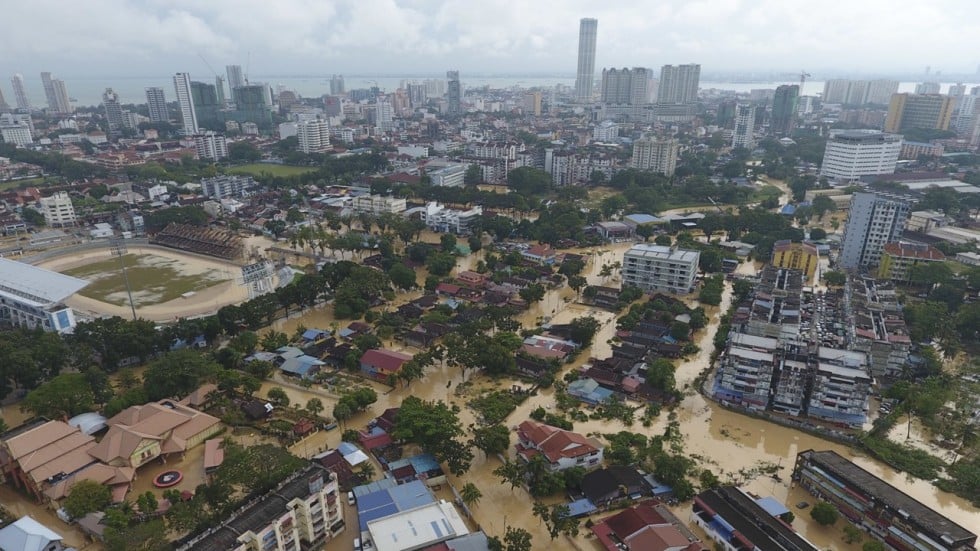 |
Wake-up call: The floods that hit Penang in 2017 exposed its lack of flood mitigation and disaster preparedness.
|
As dark clouds hang over Penang almost every morning now to herald the coming monsoon, talk of flooding in the state assembly sitting on Tuesday led to several lawmakers and the Speaker himself wanting to have a say.
“I am aware that some government agencies belittle the efforts of assemblymen who highlight flooding and other problems.
“As legislators who face the rakyat, they are carrying out their duties and I hope that the relevant agencies will take them seriously and not make fun of them,” said Speaker Datuk Law Choo Kiang during the day’s proceedings.
Lim Siew Khim (PH-Sungai Pinang) told the assembly how she and Ong Ah Teong (PH-Batu Lanchang) suffered verbal insults when visiting flood victims in Kampung Bukit Dumbar, where homes were flooded seven times, including a few days before the recent Chinese New Year.
This led to Dr Norlela Ariffin (PH-Penanti), Ong and Teh Lai Heng (PH-Komtar) to also stand up and voice their grouses.
Outside the hall, Ong said government officers handling flood problems tend to ignore the pleas of assemblymen.
“We are all in the same WhatsApp groups. When we highlight floods, they never respond,” he said.
Teh told the assembly that government officers don’t face the residents but the assemblymen bear all the insults from flood victims in their constituencies.
Dr Norlela said when she attended the monthly district meetings and called for strict enforcement to end the source of floodings such as deforestation, her pleas were often met with silence.
While the Sungai Pinang Flood Mitigation Plan – delayed for 20 years – has begun again with renewed federal funding, many are worried that the south-west monsoon will still bring back the floods this year.
Scientists Sheeba Nettukandy Chenoli and Chai Heng Lim, in a research paper published last November in the “Journal of Atmospheric and Solar-Terrestrial Physics”, found that the onset of the mid-year monsoon will be on May 19 with a standard deviation of eight days.
State Environment Committee chairman Phee Boon Poh said this was the season when rain coinciding with extra high tides fuelled by the super full moon could lead to severe flooding.
“Between May and June, strong winds stir up huge tidal waves that are not safe for small boats,” he said.
A freak storm on Sunday caused several trees to fall on Penang island, one of them in Tanjung Bungah falling on a passing car.
To keep falling trees in check, State Works Committee chairman Zairil Khir Johari said a special committee was ironing out a method to pass the care of public trees from the Public Works Department (JKR) to Penang Island City Council (MBPP).
“JKR specialises in building and caring for roads and bridges but MBPP has a full landscaping team that includes arborists.
“This team has the know-how to care for public trees and recognise diseased trees that must be felled before they become a hazard.
“We are finalising a method for MBPP’s landscapers to have island-wide jurisdiction of roadside trees and be granted access to federal grants for their maintenance,” he said.
By Arnold Loh and R. Sekaran The Star
Read more ..
Expecting the unexpected

Related posts:
Hills, landslides, floods and damaged houses: What to do?
Absorb New ways to prevent floods

Make environment our 2018 priority

Penang floods and landslides, looking beyound natural causes!

Penang govt rapped over hill slope development

Floods hit Bujkit Jambul & Hong Seng Estate in Penang

Penang hit by floods again !
Penang floods, support pours in for dialogue
Penang landslides & flooding are natural disasters man-made?
PAC blamed Penang Island City Council (MBPP) for failing to enforce laws on hillside development

Has Penang Island’s growth & development become a hazard to life?
Penang bald Hillslopes a "time bomb"

Call to reassess Penang hillside projects, councillor addresses full council meeting of MBPP

Penang Forum tells Chief Minister: the unmitigated disasters on hill projects












